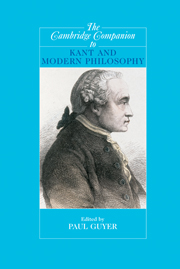Book contents
- Frontmatter
- Introduction: The starry heavens and the moral law
- 1 “A Priori”
- 2 Kant on the perception of space (and time)
- 3 Kant’s philosophy of mathematics
- 4 Kant on a priori concepts: The metaphysical deduction of the categories
- 5 Kant’s philosophy of the cognitive mind
- 6 Kant’s proofs of substance and causation
- 7 Kant and transcendental arguments
- 8 The critique of metaphysics: The structure and fate of Kant’s dialectic
- 9 Philosophy of natural science
- 10 The supreme principle of morality
- 11 Kant on freedom of the will
- 12 Mine and thine? The Kantian state
- 13 Kant on sex and marriage right
- 14 Kant’s theory of peace
- 15 Kant’s conception of virtue
- 16 Kant’s ambitions in the third Critique
- 17 Moral faith and the highest good
- 18 Kant’s critical philosophy and its reception - the first five years (1781-1786)
- Bibliography
- Index
1 - “A Priori”
Published online by Cambridge University Press: 28 March 2007
- Frontmatter
- Introduction: The starry heavens and the moral law
- 1 “A Priori”
- 2 Kant on the perception of space (and time)
- 3 Kant’s philosophy of mathematics
- 4 Kant on a priori concepts: The metaphysical deduction of the categories
- 5 Kant’s philosophy of the cognitive mind
- 6 Kant’s proofs of substance and causation
- 7 Kant and transcendental arguments
- 8 The critique of metaphysics: The structure and fate of Kant’s dialectic
- 9 Philosophy of natural science
- 10 The supreme principle of morality
- 11 Kant on freedom of the will
- 12 Mine and thine? The Kantian state
- 13 Kant on sex and marriage right
- 14 Kant’s theory of peace
- 15 Kant’s conception of virtue
- 16 Kant’s ambitions in the third Critique
- 17 Moral faith and the highest good
- 18 Kant’s critical philosophy and its reception - the first five years (1781-1786)
- Bibliography
- Index
Summary
ORIGINS
Although Kant introduced many pieces of technical terminology to articulate the themes of his critical philosophy, perhaps none is more pervasive than “a priori.” The initial care, and apparent precision, with which the termenters the Critique of Pure Reason quickly gives way to profligacy, as all sorts of things come to be hailed as a priori. My aim in this essay is to bring some order to Kant's many-sided usage.
One source of Kant's conception is evident. Many of his predecessors had recognized that there are apparently items of human knowledge that do not rest upon our everyday processes of sensory observation, and had supposed that there must be other sources that deliver knowledge of these types. In the more ambitious versions of this idea, there is a rich collection of “truths of reason,” among which earlier philosophers had sometimes counted controversial metaphysical principles, as well as generalizations they took to be fundamental to nascent physical science.
Even those most firmly committed to empiricism, and to the thesis that human knowledge is based upon sensory observation, made a place for something like a priori knowledge. The classical British Empiricists were unwilling to grant that our knowledge of logical truths and of the principles of mathematics – by which they understood basic arithmetical identities and Euclidean geometry – is justified by some process of sensory experience.
- Type
- Chapter
- Information
- The Cambridge Companion to Kant and Modern Philosophy , pp. 28 - 60Publisher: Cambridge University PressPrint publication year: 2006
- 4
- Cited by



